Table of Contents
- The State of AI Music Generation in 2024
- Popular AI Music Tools for Indie Artists
- Potential Benefits for Indie Artists
- Challenges and Ethical Concerns
- Practical Strategies for Leveraging AI in Music Production
- The Future of AI in Indie Music
- A wrap 🌯
Imagine a world where hit songs are crafted by algorithms, and melodies spring forth from silicon chips rather than human hearts. This isn’t science fiction—it’s the reality of AI music generation in 2024. For indie artists, this technological revolution is both thrilling and terrifying. As artificial intelligence continues to reshape the music industry, understanding AI music generation is no longer optional—it’s essential for survival and success in the modern musical landscape.
In this article, we’ll dive deep into the world of AI music generation for indie artists, exploring its potential to be both a powerful ally and a formidable competitor. We’ll uncover the latest tools, techniques, and trends that are reshaping the way music is created, distributed, and consumed. By the end, you’ll have a clear understanding of how AI can fit into your creative process and what it means for the future of indie music.
The State of AI Music Generation in 2024
Artificial Intelligence has made significant strides in music creation over the past few years. In 2024, AI music generation systems can compose full-length songs, create complex harmonies, and even mimic specific artists’ styles with uncanny accuracy.
According to a 2023 report by the International Federation of the Phonographic Industry (IFPI), AI-generated music accounts for approximately 5% of all new releases on major streaming platforms. This figure is expected to rise to 15% by 2026, highlighting the growing influence of AI in the music industry.
“The current generation of AI music tools can analyze vast databases of existing music to understand patterns in melody, harmony, and rhythm. They then use this knowledge to generate new compositions that are often indistinguishable from human-created music.”
Dr. Emily Chang, a leading researcher in AI and music at MIT
Popular AI Music Tools for Indie Artists
Several AI music generation tools have gained popularity among indie artists:
- AIVA (Artificial Intelligence Virtual Artist): Specializes in creating original classical and instrumental music.
- Amper Music: Offers AI-powered music creation for video, podcasts, and other content.
- OpenAI’s MuseNet: Generates multi-instrumental music in various styles.
- Boomy: Allows users to create and distribute AI-generated songs with minimal input.
- Endel: Creates personalized soundscapes based on user data and preferences.
Each of these tools offers unique features and capabilities, catering to different aspects of the music creation process.
Potential Benefits for Indie Artists
AI music generation offers several advantages for indie artists:
Cost-saving: AI tools can reduce the need for expensive studio time or session musicians. Creativity enhancement: AI can provide inspiration and help overcome writer’s block. Rapid prototyping: Artists can quickly generate and test multiple ideas. Time efficiency: Routine tasks like mixing and mastering can be automated, allowing artists to focus on creative aspects.
“Using AI tools has allowed me to experiment with ideas I never would have thought of on my own. It’s like having a tireless collaborator who’s always ready to try something new.”
Jack Thompson, an indie electronic artist

Challenges and Ethical Concerns
Despite its potential benefits, AI music generation raises several concerns:
Copyright issues: The legal status of AI-generated music remains unclear in many jurisdictions. Artistic integrity: Some argue that AI-generated music lacks the emotional depth of human-created works. Market oversaturation: As AI makes music creation more accessible, there’s a risk of flooding the market with content. Job displacement: There are concerns that AI could replace human musicians in certain roles.
“We must carefully consider the implications of AI in music creation. While it offers exciting possibilities, we need to ensure it enhances rather than replaces human creativity.”
Music ethicist Dr. Sarah Lawson
Practical Strategies for Leveraging AI in Music Production
To effectively use AI in your music production:
- Use AI for inspiration: Generate ideas or starting points for your compositions.
- Automate routine tasks: Let AI handle time-consuming processes like mixing or mastering.
- Experiment with hybrid approaches: Combine AI-generated elements with your own compositions.
- Stay informed: Keep up with the latest AI music tools and techniques.
- Maintain your unique voice: Use AI to enhance, not replace, your artistic vision.
- Legal Considerations
As of 2024, the legal landscape surrounding AI-generated music is still evolving. In the United States, the Copyright Office has stated that AI-generated works without human input are not copyrightable. However, works that involve significant human creativity in conjunction with AI may be eligible for copyright protection.
The European Union has introduced guidelines requiring clear disclosure when AI is used in content creation, including music. Artists using AI must be transparent about its use in their work.
The Future of AI in Indie Music
Industry experts predict several trends for AI in indie music:
- More sophisticated and user-friendly AI music tools
- Increased integration of AI in live performances
- AI-powered personalized music experiences for listeners
- Emergence of new genres and styles facilitated by AI
Music futurist Mark Richards predicts: “By 2030, we’ll likely see AI becoming an integral part of the music creation process for most artists, much like how digital audio workstations are today.“
A wrap 🌯
AI music generation is neither a panacea nor a threat to indie artists—it’s a powerful tool that, when used thoughtfully, can enhance creativity and productivity. As we navigate this new landscape, it’s crucial to stay informed, experiment responsibly, and always prioritize your unique artistic voice.
The future of music is a collaboration between human creativity and artificial intelligence. By embracing AI as a tool rather than fearing it as a competitor, indie artists can unlock new realms of creative possibility. The key is to use AI to amplify your artistic vision, not to replace it.
As you explore the world of AI music generation, remember that technology is just a means to an end. Your experiences, emotions, and unique perspective as an artist are what truly resonate with listeners. Use AI to enhance these qualities, and you’ll be well-positioned to thrive in the ever-evolving music landscape of 2024 and beyond.


